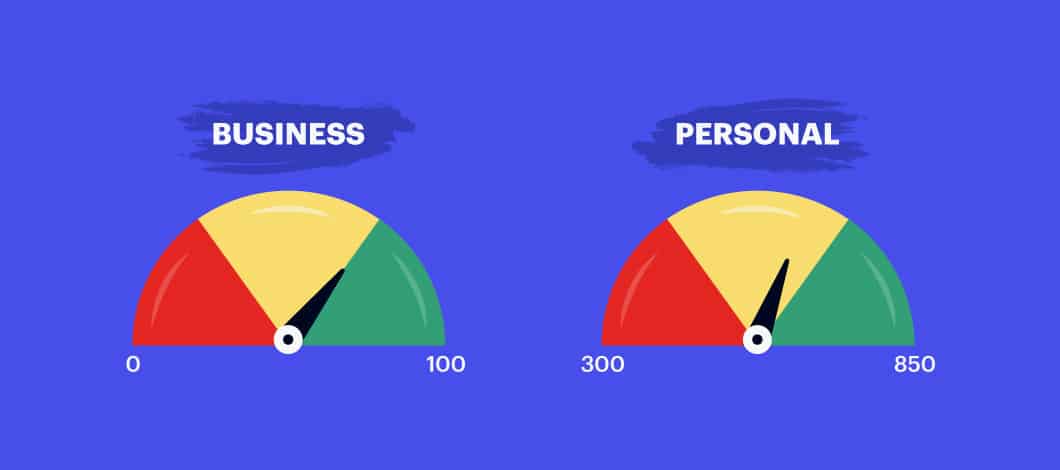In the height of the COVID-19 pandemic, 50% of small businesses took on debt and 38% made late payments or missed payments entirely, according to the Federal Reserve Banks’ Small Business Credit Survey of 2021. Was your small business among them? Did your credit score drop as a result?
If you answered yes, you weren’t alone. Now that business is picking up, how can you improve your business credit score?
Here are several steps you can take.
7 Best Ways to Raise Your Credit Score for Business
When you’re wondering how to improve your business credit rating, use these strategies and help business owners get ahead.
1. Develop Credit Relationships With Parties That Report Payments
Whether suppliers or loan providers, if you’re looking to improve your business credit score, you’ll want to be sure whomever you’re borrowing from is reporting your payments to the business credit bureaus.
Take a vendor relationship, for example. Your purchases of materials and supplies through your vendor, extended through trade credit, could help you in this regard.
If your vendor or supplier doesn’t share your payment data with the bureaus automatically, you may still be able to list them as a trade reference, as Dun & Bradstreet notes. The financial services firm may then contact the vendor directly for more details about your credit history, which could be added to your report.
2. Stay On Top of Payments
The Federal Reserve Banks’ report showed 44% of small businesses surveyed had difficulty making payments on debt. Late payments are one way a credit score can be negatively impacted. Counteract this by making regular, timely payments. If you can pay early, even better.
3. Let Your Creditor Know If You’re Going to Be Late
If you know you just won’t be able to make your installment payment, be truthful with your lender. Keep your lender in the loop about your situation. Also, ask the lender not to report the late payment to the credit bureaus. Although not always the case, the outcome could fall in your favor.
4. Keep Debt Levels Low
Pay down or pay off your balances entirely if you can. Also, use less of your available credit, such as by decreasing your business credit card spending. It’s suggested that borrowers use no more than 10%-15% of available credit.
Additionally, if you find yourself in a position to do so, pay more than once a month. This lowers your outstanding debt, another factor that helps improve credit scores.
5. Increase Available Credit
Increasing your available credit improves your debt-to-credit ratio, a factor lenders consider when evaluating loan requests. You can improve this ratio by requesting a credit limit increase. Another strategy is to open a new credit line or business credit card. However, avoid the temptation to use it, which would be counterproductive.
6. Don’t Close Accounts
In a similar vein, avoid closing accounts. Closing accounts will change your debt-to-credit ratio because you won’t have as much credit available to you. If you’ve paid off your debt on an account, such as a business credit card, just keep it open. In addition to helping your credit score, it can serve as backup financing if an emergency arises.
7. Know What’s On Your Credit Report
Last but not least, be sure to regularly review your business credit reports and ensure the information on all of them is correct. This is particularly important because a vendor or client may pull your credit report from one agency but not another.
If you find any errors, whether it’s an incorrect address, a reporting error or something else, correct or dispute it with the credit-reporting firm. Also, keep an eye out for any fraudulent activity.
Keep in mind, as time passes, your business credit score can fluctuate. As such, it’s good to be proactive and know where you stand.
Factors for Business Credit Score Calculations
While each reporting agency calculates its scores differently, there are a number of factors that come into play for the calculations, including:
- Debt
- Payment history
- Industry risk
- Company size
- Credit usage
- Tradeline history
- Public records
- Length of credit history
How to Establish Business Credit When You Have None
What can you do if you don’t have a history with the major credit reporting firms? In addition to the aforementioned tips, including paying on time and applying for loans with lenders who report your payment history, here are a few ways you can build business credit from scratch.
- Formalize your business: Incorporate your business, get an employer identification number and a D-U-N-S number.
- Open business credit files: If you’ve gotten your D-U-N-S number, then a credit file has been opened for your business. However, if not and if the major reporting agencies haven’t already generated a business credit file for your company, do so.
- Request supplier tradelines: When you’re just starting out, it’s important to connect with vendors that report payment history to the credit bureaus. If you have an existing relationship with a vendor that doesn’t report, ask them to consider doing so.
- Apply for a business credit card: If you don’t have a history of business credit in place, you may still be able to qualify for a business credit card, which could help build your credit history.
Benefits of Boosting Your Credit Score in Business
A low credit score was the reason 33% of small businesses were discouraged from applying for financing, according to the Federal Reserve Report. An additional 23% stated it was because they had an insufficient credit history.
Not only does a higher business credit score mean a better chance of loan approval, it could lead to one or more of the following benefits:
Better Terms With Suppliers
Improving your credit score in business can lead to more competitive terms with suppliers and vendors. For instance, instead of a 30-day payment period, referred to as net 30, you might qualify for a 90-day repayment period. A bonus? Longer terms mean better cash flow in the interim.
Better Terms With Lenders
If you improve your business credit, you also will benefit from better loan terms. Lenders want to see you’re a reliable borrower. Once you establish a strong credit history, you’ll likely find better financing options, such as one or more of the following: more access to capital, longer repayment terms, lower interest rates.
Lower Commercial Insurance Premiums
Some insurance providers will research a business’s financials and review its credit score evaluating a company seeking commercial insurance. It’s possible that a higher business credit score could equate to a more competitive premium.
Business vs. Personal Credit Scores
Wondering how business credit scores differ from personal credit scores? Here are a few ways.
Cost
Business credit reports typically are available for a fee. Equifax, for instance, offers single business credit reports for $99.95, while Experian offers a detailed business credit report for $49.95. Dun & Bradstreet offers a free 14-day trial of its monitoring service (i.e., D&B CreditSignal), which entitles a user to view 4 of its business credit scores and ratings, after which users must upgrade to a paid plan of either $15 or $39 a month.
With personal credit reports, you’re entitled to one free copy from each reporting firm every 12 months, available at AnnualCreditReport.com. There also are free credit monitoring sites, such as Credit Karma.
Accessibility
Any person, vendor, client or company can search for and purchase any business’s credit report. This isn’t the case with personal credit reports, which only are available to the individual or those allowed under the law, such as a dealership you’ve authorized to pull your credit report when you’re buying a new car.
Credit Score Ranges
Most commonly, business credit scores range from 0-100, though FICO business credit scores go up to 300. On the other hand, personal credit scores range from 300 to 850.
What Is a Good Business Credit Score?
There are several different business credit rating and scoring models, including the following:
- Dun & Bradstreet’s Paydex Business Credit Score
- Dun & Bradstreet Delinquency Predictor Score
- D&B Failure Score
- Equifax Payment Index
- Equifax Business Credit Risk Score
- Equifax Business Failure Score
- Experian’s Business Credit Score
- FICO Small Business Scoring Service (SBSS)
Because of that, there are different business credit score ranges and different ways credit scores are calculated.
For D&B, 80 or higher is considered a good credit score. In contrast, Equifax sees 90 as a good score, while a score in the mid-70s is considered good with Experian. For FICO, you’ll need at least a score of 160. (For Small Business Administration (SBA) loans, the minimum SBSS score is 155.)
Building (or Rebuilding) Your Credit Score for Business
If you want to know the fastest way to raise your credit score, the truth is the process takes time.
By focusing on the steps we’ve outlined, though, you can build your credit and work toward positive results that can have a long-lasting impact on your business.






